62, NO.
WHY DO WE READ THE BIBLE? THE MB HERALD INTERVIEW ANNE LALONDE & VÉRONIQUE BEUDIN HOLY SPIRIT—FILL US WITH YOUR FAITHFULNESS


62, NO.
WHY DO WE READ THE BIBLE? THE MB HERALD INTERVIEW ANNE LALONDE & VÉRONIQUE BEUDIN HOLY SPIRIT—FILL US WITH YOUR FAITHFULNESS


Your financial investment in the MB Conference continues to facilitate ministry growth in practical and profound ways. Your investment helps provide mortgages to MB churches and pastors that may otherwise be unavailable. This enables churches and pastors to have a presence in the communities they serve.
Income generated by CCMBC Investments is directed to ministry to help grow God’s Kingdom by supporting activities such as church planting, pastor leadership training and other church-led ministry efforts.
Mennonite Brethren Herald Digest is digitally published monthly by the Canadian Conference of Mennonite Brethren Churches, primarily for the use of its members, to build a Canadian MB community of faith. We seek to 1) share the life and story of the church by nurturing relationships among members and engaging in dialogue and reflection; 2) teach and equip for ministry by reflecting MB theology, values, and heritage, and by sharing the good news; 3) enable communication by serving conference ministries and informing our members about the church and the world. However, the opinions expressed here are not necessarily those of the church as a whole.
AUGUST, 2023 | VOLUME 62, NO. 8
EDITORIAL OFFICE
1310 Taylor Avenue
Winnipeg, Manitoba R3M 3Z6
Phone: 204-669-6575
Toll-free in Canada: 888-669-6575
MBHERALD@MBCHURCHES.CA
WWW.MBHERALD.COM
ISSN: 0025-9349
The Mennonite Brethren Herald is a publication of
CANADIAN CONFERENCE OF MENNONITE BRETHREN CHURCHES
6 Q&R CORNER
Ken Esau
16
9 THE MB HERALD INTERVIEW
Anne Lalonde & Véronique Beudin
12
WHY DO WE READ THE BIBLE?
Brian Cooper
CONFÉRENCE CANADIENNE DES ÉGLISES DES FRÈRES MENNONITES
GODS OF INSTAGRAM: ADDICTED TO OUTRAGE
Vic Neufeld
14 HOLY SPIRIT—FILL US WITH YOUR FAITHFULNESS
Ken Esau
Connect
FACEBOOK.COM/MBHERALD
TWITTER.COM/MB_HERALD
SOUNDCLOUD.COM/MBHERALD MBHERALD.COM
Sharing the life and story of Mennonite Brethren in Canada
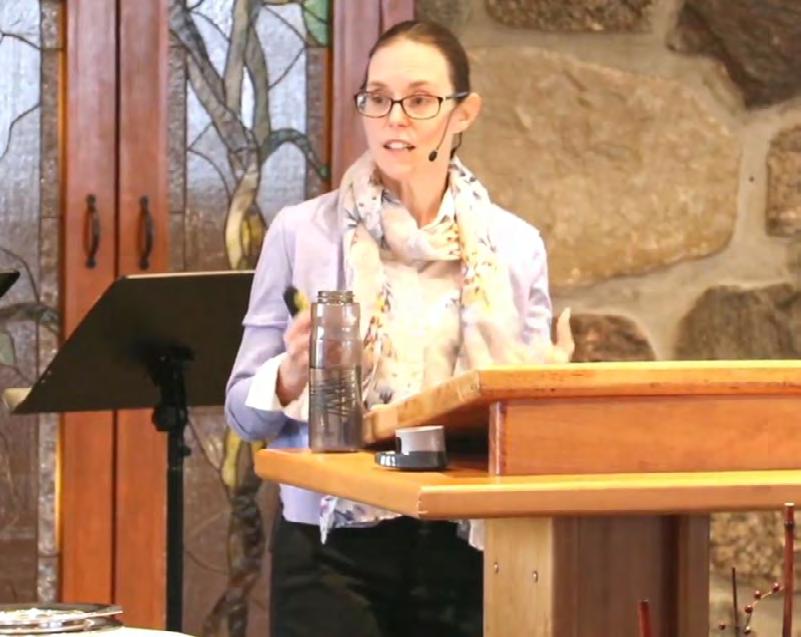
Ifind myself unsettled in the in-between as of late. I’m in-between vacation, just returning from a week, and awaiting two weeks later this month. Organizationally we are in-between leaders in search of a new national director. That’s not to say Elton DaSilva isn’t actively engaged in the role; he certainly is. Still, we are in that in-between season of change, wondering what the future holds, knowing that whatever it is, it will be different from the present. We are in Ordinary Time on the Christian calendar, the season between Easter and Advent. If you think Ordinary Time sounds boring, I don’t blame you for feeling that way. Who calls anything ‘ordinary” without expecting it to fall flat?
Yet it’s in times like these we can rediscover the presence of God in our lives. As in a comfortable hammock between two trees, we can rest knowing that the Holy Spirit is at work in our ordinary lives. God’s faithfulness doesn’t adhere to a calendar or a schedule. Ken Esau writes in this month’s Moment in prayer, “Faithfulness will in many situations mean being present to help others in need as we are able. It will, in many situations, mean providing a listening ear and honouring confidentiality.”
What if your in-between—your ordinary time—is someone else’s season of struggle and drought? Are we being called to shift our attention from ourselves to caring for a neighbour?
If we don’t know how to do this, Véronique Beudin suggests we turn to Matthew 5-7, the sermon on the mount. “Jesus told us to be with those who are marginalized,” says Beudin. “We sometimes need to learn how to interact with marginalized people, which feels hard, so we don’t.” Let’s pray that this not be our attitude. Let us pray that we have the awareness and the courage to put others first, even when difficult. Beudin and Anne Lalonde, two women making a lasting impact in their communities in Quebec, are interviewed on page 9.
My gratitude to this month’s contributors. Of note, Brian Cooper (Why do we read the Bible? Faith, focus, and Biblical authority)and Vic Neufeld (Gods of Instagram: Addicted to outrage). Thank you to our readers who support us constantly, even in the in-between times.
With respect, Carson
CARSON SAMSON Communications director
ABOUT CCMBC:
The Canadian Conference of MB Churches (CCMBC) is the national Conference for MB Churches in Canada. CCMBC exists to resource its churches through partnerships with six provincial conferences in Quebec, Ontario, Manitoba, Saskatchewan, Alberta, and British Columbia. This Canadian Conference has also established national agencies whose joint mission is to provide services to Canadian MB Churches. The national agencies are MB Seminary, Legacy, and Multiply. Furthermore, CCMBC offers services and resources through its internal departments, such as the Centre for MB Studies and Kindred Productions
CCMBC seeks its next National Director to help our family of 230+ churches move closer to our shared mission/vision: “to cultivate a community and culture of healthy disciple-making churches, faithfully joining Jesus in his mission.” This mission/vision is to be accomplished through collaboration and shared participation in our Collaborative Unified Strategic Plan (CUSP), which desires “healthy disciple-making churches” that are:
˚ Growing in spiritual and theological health
˚ Developing excellent leaders
˚ Pursuing local and global mission together
˚ Becoming more organizationally healthy. The National Director is a committed disciple of Jesus who serves as an ambassador representing CCMBC inside and outside our CCMBC community of churches and agencies. The National Director must, therefore:
˚ Be willing to embody and live out with integrity a spiritual life, theology, character, and mission that aligns with CCMBC's mission/vision, the MB Confession of Faith, and the MB Code of Personal and Ministry Ethics.
˚ Be (or willing to become at the time of hiring) a credentialed MB leader and an active member in a local MB church in good standing with its provincial MB conference.
This type of management role necessarily requires a highly relational, team-oriented, results-focused servant leader with a commitment to and skills that fit this collaborative leadership model.
˚ Promote CCMBC's mission/vision “to cultivate a community and culture of healthy disciple-making churches and ministries, faithfully joining Jesus in his mission.”
˚ Serve the purposes and goals of CCMBC as articulated by the Executive Board and affirmed by the National Assembly
˚ Serve under the leadership and accountability of the Executive Board who embodies the collective will of the National Assembly.
˚ Work collaboratively with the Executive Board to establish and implement agreed-upon annual goals and outcomes.
˚ Overseeing the financial operation of CCMBC within the authority and limits described in the CCMBC’s Governance Manual (GP 3-1, 3-2).
˚ Implementing the Collaborative Unified Strategic Plan by working well with all the partners to fulfill CCMBC’s larger mission.
˚ Lead the National Ministry Team in its mandate “to enable collaborative leadership actions among the senior staff of all Member Organizations in implementing the Collaborative Unified Strategic Plan” (CCMBC GOB 10.2).
˚ Work collaboratively with the National Faith & Life Director and the CCMBC Legacy Fund Inc. Chief Executive Officer.
˚ Develop, oversee, evaluate, and manage the CCMBC staff team consistent with the approved CCMBC Employee Manual—to fulfill the Conference's mission, vision, and goals of the Conference.
For a full job description, click here.
To learn more about CCMBC, visit our website
Interested applicants are invited to submit a cover letter and resume to the Search Team Chair, Michael Dick at michael.dick@mbchurches.ca
The closing date for applications is September 30, 2023, or until the position is filled. The start date is negotiable.

It is with sadness, but also enduring gratitude, that Mennonite Central Committee (MCC) announces the closure of book sales activities of the Mennonitische Post, effective March 31, 2024. This includes the closure of the brick-and-mortar bookstores in Steinbach and Winkler, Manitoba. It also signals the end of book orders and shipping to locations across North America.
Die Mennonitische Post, as well as Das Blatt magazine for children and teachers, will continue as usual. The paper is printed and distributed biweekly, while the magazine is distributed monthly.
The Mennonitische Post book ministry has been part of MCC’s education work since the early 1980s. It has promoted literacy and learning by selling and shipping books, Bibles and other reading materials to Low German-speaking communities in Canada, the U.S. and South and Central America.
Over the last number of years, the book sales’ customer base has changed, serving fewer people with no other access to books. As well, retail downturns have hit the Post’s brick-andmortar stores, making the current sales model unsustainable.
“A long-held and very unique element of MCC’s ministry comes to an end after serving its purpose with excellence for decades,” says MCC Canada Executive Director Rick Cober Bauman. “Ecclesiastes 3:1 reminds us there is a season for everything. As we conclude this season, we look back and celebrate what has passed. We are deeply grateful for the years of ministry carried out by faithful staff and volunteers.”
For 40 years, the Mennonitische Post team has been committed to serving the most vulnerable, especially women and children. The impact of the book ministry has been significant, with tens of thousands of people gaining access to books and information who would otherwise be without.
The closure of the book ministry will mean the elimination of several roles. MCC is committed to treating all employees fairly and generously during this transition.
Book sales will continue as usual while staff develop a plan to sell or distribute remaining inventory.
KALMER,Mennonite World Conference invites you and your congregation to observe Peace Sunday together with brothers and sisters in the global Anabaptist church family on 17 September 2023

The theme for this year’s Peace Sunday is: “We are Family! Participating in God’s family.” This year’s Peace Sunday resources (available here) explore what makes a “family” a space in which people can embody just and peaceful relationships with one another, witnessing to God’s shalom.
In Matthew 12:46-50, Jesus challenges and re-draws images of family: not prescribed by a given structure but shaped by the quality of relationships; not characterized by the absence of conflict or tension, but how these are addressed.
May these resources help us in this pursuit.
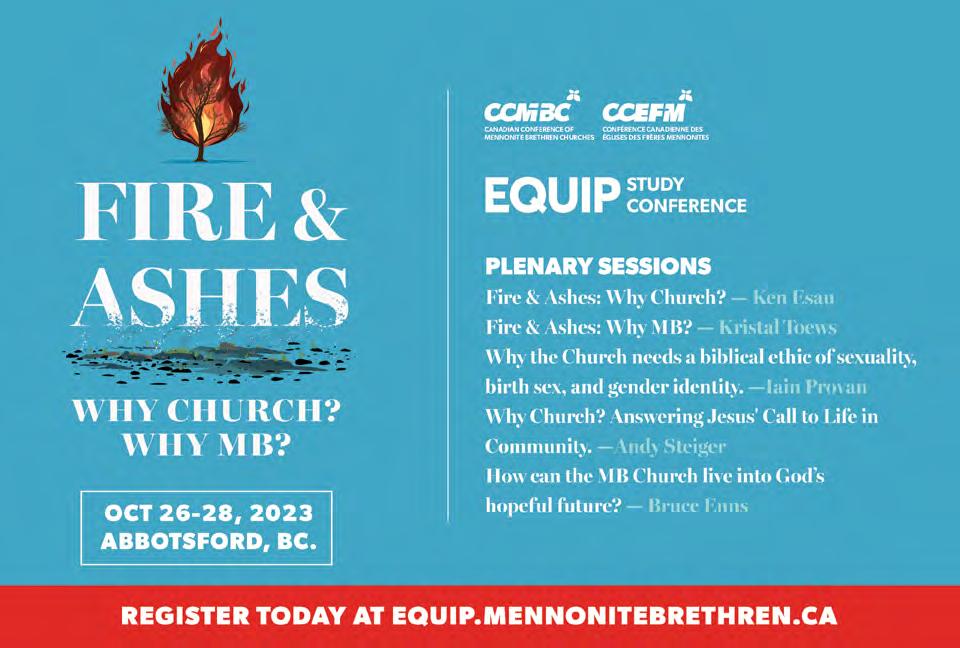
Judy Schmidt likes to cook—even for 20 or more people at a time.
That’s what the 66-year-old retired banker was doing in March, where she served as head cook for a month with Mennonite Disaster Service (MDS) in Jennings, Lousiana.
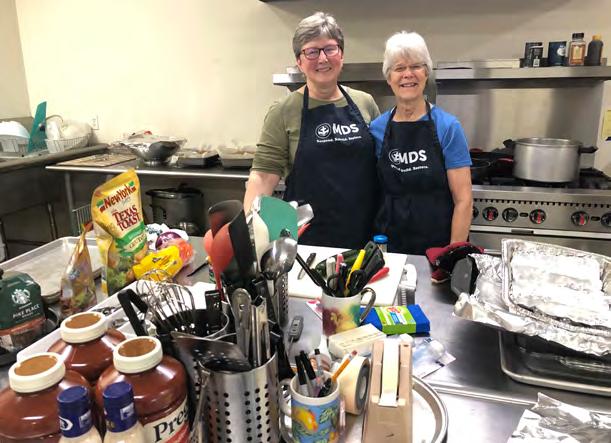
For Schmidt, who attends the Selkirk, Man. Community Church (Mennonite Brethren), it was
the seventh time volunteering with MDS, all except one time as a cook.
Prior to going to Jennings, where volunteers are repairing damage to houses from hurricanes Delta and Laura in 2020, she served in Florida, South Dakota, California, South Carolina and Mississippi.
“It’s a big job preparing breakfast and supper for 20-25 people each week,” she said. “But it’s important and fulfilling. Volunteers need lots of good food to be able to serve each day.”
A typical weekday as a cook finds her rising at 5 a.m. to get breakfast ready. “It’s get up, wash, brush my hair and teeth, get dressed and go,” she said.
In addition to making breakfast, Schmidt and the assistant cook—in Jennings, it was Marian Minninger of Stuarts Draft, Virginia—get things like bread, butter, cold meat, vegetables, drinks, cookies, chips and other items ready so volunteers can make their lunches at 6:30 a.m.
After breakfast and devotions, volunteers leave for work about 8 a.m. Then it’s time for clean up and to think about supper.
Read the full story at MBHerald.com
Q&R corner provides responses to questions that readers may have about CCMBC and its work collaborating with provincial MB conferences in areas of spiritual health and theology, leadership development, mission, and organizational health in order to achieve the overall mission: “To cultivate a community and culture of healthy disciple-making churches and ministries, faithfully joining Jesus in his mission.” If you would like to contribute a question, please send it to questions@mbchurches.ca
Please note that we will not be using your name in the MB Herald Digest in order to respect those who prefer anonymity. There may not be space to respond to every question—and sometimes we might not really have the ability or authority to respond to some questions (for example, those that relate more directly to one of our provincial MB conferences or to a local church leadership). We apologize in advance if we are unable to publish a response to your specific question.
WHAT IS THE MB POSITION ON EXORCISM? IS THIS SOMETHING THAT WE PRACTICE OR SHOULD PRACTICE WITHIN OUR CHURCHES AND MINISTRIES?
K.Thanks, K., for this email. You have asked a question that does not come up often in our church family but is important.
The word “exorcism” (or “deliverance”) is commonly defined as something like this: A ritualized process where a skilled and gifted individual (technically an ‘exorcist’) forcibly commands one or more demonic forces who have taken up ‘residence’ within a person to leave that person. If the process is deemed successful, there would need to be some visible evidence that this has actually happened.
Article 4 of our MB Confession of Faith acknowledges the power of sin and Satan and the universal enslavement of humanity: (Note: several Confession of Faith sentences have been bolded to highlight key points.)
Sin is a power that enslaves humanity. Satan, the adversary, seeks to rule creation and uses sin to corrupt human nature with pride and selfishness. In sin, people turn from
God, exchanging the truth about God for a lie, worshipping and serving the creature rather than the Creator. Sin opens individuals and groups to the bondage of demonic principalities and powers. These powers also work through political, economic, social, and even religious systems to turn people away from holiness, justice, and righteousness. Whether in word, deed, thought, or attitude, all humans are under the domination of sin and, on their own, are unable to overcome its power
To summarize what this means:
There is certainly a reality to spiritual forces that desire to “steal, kill, and destroy” (John 10:10).
All humans (and this sentence in the Confession should be understood as “all humans who have NOT been saved/freed by Jesus”) are enslaved to Satan, sin, and death—sometimes willingly and knowingly but most often without even having knowledge of the reality of their situation (cf. John 8:34; Romans 3:9; 6:12-14).
For some humans without Christ, this can grow to the point where they are so overpowered by these
spiritual forces of darkness, that it seems like the spiritual forces have taken up “residence” inside that person who seems to have very limited positive influence over their own lives. Most often in the New Testament accounts, the person with an unclean spirit does not even come on their own to Jesus but is brought by others (e.g., Matthew 8:16; Mark 9:17-18).
Article 5 of our MB Confession of Faith describes how the ultimate “exorcism” or “deliverance” from spiritual forces of darkness is done by God in and through the process of conversion and salvation.
Throughout history, God has acted mightily to deliver people from bondage and draw them into a covenant relationship. Through the prophets, God prepared the way of salvation until finally God reconciled the world to Himself by the atoning blood of Jesus. As people place their trust in Christ, they are saved by grace through faith, not of their own doing, but as a gift of God. God forgives them, delivers them from sin’s bondage, makes them new creatures in Christ, empowers them by the Holy Spirit, and seals them for eternal life. When sin and death are finally abolished and the redeemed are gathered in the new heaven and the new earth, God will have completed the plan of salvation.
Though Jesus entered a world ruled by sin, He chose not to submit to its allure and broke its domination. Through His obedient life, His death on the cross, and His glorious resurrection, Christ triumphed over Satan and the powers of sin and death, opening the way for all people to follow. Convicted by the Holy Spirit, people turn from sin, entrust their lives to God, confess Jesus Christ as Lord, and join the family of God. All who receive Christ are born again, and have peace with God, and are called to love one another and live at peace with their neighbour. Those whom God is saving no longer live for themselves, for they have been set free from sin and called to newness of life.
To summarize what this means:
The biggest “defeat,” “deliverance” from, or “exorcism” of the spiritual forces of darkness took place by means of “the cross and resurrection when Jesus drove out the prince of this world (John 12:20-33),” “bound [Satan]…plundered his house (Mark 3:27),” and drove him “from the centre of power (Colossian 2:15; Ephesians 1:20-24)” (BFL 2004 Spiritual Warfare Study Conference Affirmations). This defeat and deliverance becomes a reality in a person’s life when they repent, experience conversion and forgiveness, and welcome the Holy Spirit to take up residence within them (cf. Romans 6:16-23; Galatians 5:24). Jesus’ gospel invitation to freedom from bondage to Satan, sin, and death is what every local church should be proclaiming and
offering our world. Every disciple of Jesus then needs to live into the reality of this deliverance by re-orienting one’s life daily to the Holy Spirit through worship, prayer, and so on.
But all of this leaves us with several large questions:
Who exactly are the people described in the Gospels as “demon-possessed” (cf. Matthew 4:24; 8:16,28,33; 9:32) and what is the work of Jesus and the disciples when they “drive out” these demons (cf. Matthew 7:22; 8:16; 9:33; 10:8; 12:27)? The New Testament uses the expressions “demon,” “unclean spirit,” and “evil spirit” interchangeably for spiritual forces who cause significant illness, physical disability, or mental affliction to a person to the point where they have limited if any personal agency to improve their situation. In other cases, the demons give people extraordinary abilities like superhuman strength (Mark 5:3-4) or divination (Acts 16:16). In cases where Jesus encounters people described as “demon-possessed”, we do not see Jesus ever expressing an invitation to the person to come and follow him. When Jesus preaches to crowds, there is an expectation that they can respond but a demon-possessed person seems to lack this level of agency. In these cases, Jesus addresses the demon directly, commands it to leave, and never blames the person for their affliction (For more on this, see Robert Johnston, “Demon Possession and Exorcism in the New Testament,” Journal of Adventist Mission Studies, 2015).
In the Gospels and Acts, driving out the “demon” does not automatically make the person a disciple of Jesus, but it returns the person to the point where they once again have agency to make positive decisions.
If exorcisms happen in the New Testament, should we make room for exorcisms today in our church services and recognize people in our church who have the “gift” of exorcism? We begin with the conviction that disciples of Jesus are not in danger of being “demon-possessed” since they have the Holy Spirit resident within them. Disciples of Jesus are empowered by the Holy Spirit to have agency. The New Testament never describes someone in the church having demons cast out of them, nor does it list this gift in any of the gift lists that show up in the New Testament letters. This is consistent with our conviction that disciples of Jesus experience deliverance and freedom from the bondage to Satan, sin, and death at conversion.
However, it is also clear that at the time of conversion, our freedom from all spiritual forces attacking us is only partial. Even with the Holy Spirit resident in us, our present journey toward complete freedom from Satan, sin, and death is an ongoing one that will only be complete at the point of our death or the return
of Jesus. Article 10 recognizes this ongoing spiritual battle: “Disciples are to resist worldly values and systems, the sinful nature, and the devil.” We all will need to take steps to count ourselves dead to sin and not let sin reign in our mortal bodies (cf. Romans 6:11-12). As a result, all of us as disciples of Jesus can undoubtedly benefit from participation in focused and guided steps of prayer, group support/accountability, and proclamation of God’s truth over us that identify, name, and seek freedom from things in our histories that seek to enslave us again (viz., traumatic events, wounds, sinful patterns, thought processes, etc.).
These steps can be both helpful and essential as we face an enemy who “prowls around like a roaring lion looking for someone to devour” (1 Peter 5:8). The goal is not to “deliver” believers or “exorcise” satanic or demonic forces as if they “possessed” a disciple of Jesus. Instead, we want to declare that it is the Holy Spirit alone that resides in us and possesses us: “ You, dear children, are from God and have overcome them [every evil spirit], because the one who is in you is greater than the one who is in the world” (1 John 4:4, emphasis added). The “one who is in the world” no longer “resides” within disciples of Jesus.
Discipleship is not about seeking ongoing post-conversion “exorcisms” or “deliverances” but about putting on the full armor of God (Ephesians 6:11-13) to combat the outside enemy who uses every possible weapon in an attempt to re-enslave us. We do not deny the reality of spiritual forces of darkness and our need to “throw off everything that hinders and the sin that so easily entangles” and fix our eyes on Jesus (Hebrews 12:1-2). A preoccupation with spiritual forces of darkness can encourage people to live in fear rather than in the fruit of the Spirit. Fear itself is a spiritual force that steals, kills, and destroys (cf. 2 Timothy 1:7)—especially in the lives of children. Rather than fear, we want to live into a posture of love, worship, adoration, and praise in the context of our local church community (cf. 1 John 4:18).
We do not live in fear because we know that the final victory is sure: “ The Bible is clear that there is a cosmic battle between God and Satan (Eph. 6:12). There is, however, no doubt about its outcome” (Paul Hiebert, “Spiritual Warfare and Worldviews,” Direction [Fall 2000]; 120).
If deliverance or exorcism is not something targeted at disciples of Jesus, should we be offering it as a service to non-Christians? As we have noted above, in a sense we do offer deliverance whenever we invite people to Jesus. Jesus offers freedom from the bondage of Satan, sin, and death to all those who respond to that invitation. The question is whether there are situations where individuals (who are not believers) have
A preoccupation with spiritual forces of darkness can encourage people to live in fear rather than in the fruit of the Spirit. Fear itself is a spiritual force that steals, kills, and destroys.
such physical, mental, and/or emotional burdens that they have lost all personal agency to even take the step of responding to the invitation. These burdens may be primarily physical and/or psychological and we would want to direct the person toward medical professionals while expressing our willingness to pray with them for healing. This, however, is not specifically deliverance from spiritual forces within them.
But if people come to us (or their friends or family bring them to us), and they or others discern that spiritual forces are at work in them stealing life and flourishing from them, we would be remiss not to be willing to speak truth over them and pray in the name of Jesus to be free from these powers. We have brothers and sisters inside and outside our MB family who are doing exactly this and God is answering these prayers bringing freedom and healing.
However, I would not immediately describe this event as an “exorcism,” nor label anyone in our church family as an “exorcist.” Nor would I rule out that the person should also actively seek medical assistance. Individuals may need to access multiple elements of healing to move them toward a state of agency once again. We are holistic individuals needing holistic healing of body, mind, and spirit.
In every situation we face, we want to listen to the Holy Spirit and respond faithfully out of love to every person who comes our way—wanting them to experience not only freedom from spiritual forces but much more to experience salvation and the fullness of life offered in Jesus.
Thanks again, K., for your challenging question. I hope you will pray for our whole MB family worldwide for wisdom and faithfulness in this area.
– Ken Esau (National Faith & Life Director)MBH: Tell us about yourselves
Anne: I grew up in a French-Canadian, Quebec family with a Catholic background. I didn’t attend church for most of my youth, typical for many Quebecers. Despite that, I had always been interested in faith, God, and spiritual matters, but it wasn’t ‘cool,’ and it wasn’t something you would talk about. I let that be and chose to study administration when I went to college.
I got married, had my kids, and then my mother died when I was 28. My father died when I was 3, so when my mother passed, it threw me into a weird mental loop. At three months, our youngest became sick with a pulmonary virus. The doctors said the sickness would break and she would recover, or we may go home without her. She recovered, leading me to explore my faith. Because I’m very pragmatic and logical, I studied from Protestant and Catholic perspectives. I concluded that my faith was more Protestant even though I was raised Catholic. So I searched online and started attending church, and a year later, I was baptized.
Véronique: I grew up in Gaspé in Quebec. I had a rough background when I was young and got involved with drugs and alcohol. At age 22, I began to experience occasional bouts of depression. At 25, I became pregnant. At 32, I fell into a profound depression which

uncovered deeply repressed past trauma; I broke my silence and told my mom that my uncle and grandfather abused me. I slowly started to tell other individuals and reported the incident to the police. Eventually, my case made its way into the courts.
I was so lost, depressed and confused that I didn’t want to continue living anymore. Suddenly, I decided to pray and said, “God, if you exist, you need to put someone in my path because I can’t continue living this way.” Two weeks later, I saw an advertisement in the local paper for a place called Letter For Saille, and I went on a Sunday morning. The building was filled with celebrating people, and I was unfamiliar with what I saw because I was only familiar with the Catholic and the Jehovah’s Witnesses.
This church was God’s answer to my prayer. I began to attend church more regularly and became rapidly immersed in the love of God. It was also the first time I felt people truly took care of me, believed in me, and took a chance on me. I got baptized a year later, in August 2008. In September 2009, I began my bachelor’s degree at ETEQ and continued studying part-time until 2018. During that time, I had a call on my heart to help sexually abused women, to see them healed, and for them to know the love of God.
MBH: What roles have you held within the MB Church?
Anne: I started going to Église chrétienne évangélique de Saint-Eustache, on the north shore of Montreal, the closest MB church to my little village. God works in mysterious ways: when I was in college, I attended my professor’s wedding long before my baptism. Years later, when I was searching for a church, I returned to St. Eustache, and I never left.
I started as a volunteer with their tech team, helping with sound, PowerPoint, and whatever else they needed help with. I also had small children at the time (ages 4, 1 and a half, and 9 months), so I was involved with the children’s club when they needed volunteers. When I returned to school, still serving on the tech team, I took a break from other volunteer roles because my studies required my attention. Later, I started working part-time at ETEQ as the communications coordinator and helping Kristen Corrigan, the director at the time.
After finishing my undergrad in theology from ETEQ (École de Théologie Évangélique du Québec), I started being more involved with the provincial conference. In 2019 I started working for the AEFMQ as the communications coordinator and have since taken on other roles within the conference, as well as stepping in as co-editor of Le Lien, which is the MB magazine in Québec. I became the editor of the magazine in 2020.
I stopped working at ETEQ shortly before Covid because, with my family life, I couldn’t study, volunteer at church, and work in Montreal simultaneously. My church offered me a job as a ministry coordinator. In that role, I helped with providing resources for all of the different ministries in our church. I also worked as an administrative assistant, preaching
4-7 times yearly. I’m often invited to share my testimony at other MB churches in Quebec, and I am on the provincial Faith and Life team. I served as the treasurer for the provincial board in Quebec in 2020 and worked with CCMBC on the National Communications Team.
Véronique: In 2013, I began working for ETEQ, first as a receptionist and then as a student counsellor. I see helping to prepare future leaders as my ministry to the broader evangelical community in Quebec. I have been a leader in my local church for the past ten years; I completed the pastoral accreditation process 2-3 years ago. I am on the church committee and preach a few times a year. I also work part-time with The Way Out as a chaplain and an outreach worker. This organization helps women get out of the sex industry and sex trafficking.
When I speak with women at The Way Out, I do my best to be like Jesus; I am a living testimony there. Seeing women giving their lives to Jesus is so powerful. It’s really important for me to help these women find hope and freedom.
MBH: What have been some of the highs and lows of your ministry?
Anne: I think one of the highs for me is when someone approaches me after I preach and says, “What you said touched me/touched my heart,” or “I’ve never seen things like that,” or “This is a new way to read that scripture for me.”
One of the difficulties for me was balancing finishing my undergraduate degree with volunteering so many hours at my church during the Covid pandemic. Although I wasn’t diagnosed with burnout, I was very emotionally vulnerable. It took some time for me to recover and get my energy back to be more present in all aspects of my life again.

As leaders in ministry, our desire to help others often motivates us to give more than 100%. Our focus is not on making money but on serving others. However, this can lead to burnout if we fail to listen to our bodies and prioritize our well-being. The learning curve for me—and I’m still in it— is finding the balance between my personal life, my work at church, and my volunteering at the provincial board. I know that some seasons in life or ministry are more prone to overtime, like Christmas or Easter. Still, after that, you need some downtime to recharge and replenish your energy.
Véronique: A few weeks ago, we celebrated people who received their diplomas from ETEQ. When graduates expressed gratitude, I remembered, “Oh yeah, this is why I work at ETEQ!” I was reminded that my work means something.
Another highlight is when I receive positive feedback on my preaching, especially when someone says they experienced a scripture passage in a new way. I am encouraged when remembering that God is working in His Church and that I—just as I am— have the privilege to be part of that work. I could never have seen myself in this place when I started my faith journey.
However, there needs to be a higher level of participation in ministry in Quebec. Engagement is currently quite low.
Anne: Hence the burnout!
Véronique: Yes, exactly! I believe it’s time to reconsider how we can contribute to the Kingdom of God. Volunteering and paid positions are both viable options. However, we also need to ensure that our churches recognize the talents of their members, even if specific tasks may seem less glamorous or may not be the right fit at the
WE NEED MORE PEOPLE EQUIPPED, TRAINED, AND WILLING TO SERVE IN THE CHURCH. WHEN I THINK OF THE NEXT GENERATION, I DON’T THINK OF MYSELF; I THINK OF MY KIDS.
– ANNE LALONDEmoment. It’s important not to let excuses get in the way of serving our communities.
MBH: Have you encountered varying viewpoints regarding women in ministry within our broader MB community?
Anne: Véronique has been doing this longer than I have, but in my experience, most people have been welcoming of women in ministry roles. I have not encountered gender-based discrimination or negativity while teaching or preaching. I know it happens, not necessarily in our church, but on a broader scale. But now we’re seeing more women involved with church boards, like Véronique. I get invited to preach at other churches within our MB family in Quebec, so I see opportunities and open-mindedness toward women in ministry. The older way of thinking about women in ministry is changing slowly.
The more we support women in ministry, the more it will be accepted as the norm. And it’s not that women are better than men or vice versa: each brings a valuable perspective to the church’s ministry.
Véronique: There’s a place for women called to ministry in the MB Church. My pastor has always supported me and encouraged me to continue my ministry. Some may disagree, but that disagreement doesn’t discourage me from
continuing my ministry. As Anne mentioned, having women in leadership gives another perspective, and I think that that very much reflects the image of God.
MBH: As you think about our national and local MB families, what should be some of our top priorities as a church family going forward?
Anne: Discipleship. We need more people equipped, trained, and willing to serve in the Church. When I think of the next generation, I don’t think of myself; I think of my kids. We need to be intentional about the youth, make sure they feel heard and seen, and be there for them so they don’t leave the Church. We want to be a powerful testimony and be role models for them.
Lastly, let’s prioritize diversity, whether that’s women, immigrants/newcomers, etc. The MB Church needs people from different cultural and economic backgrounds.
Véronique: Discipleship is essential for me, too, because when we learn to follow Jesus, He will lead us toward what we need to do for His Kingdom. Suppose we focus and keep our eyes on Jesus. In that case, the mission will come from Him, not our own will.
Matthew 5-7, The Sermon on the Mount, is a perfect place for us as Mennonite Brethren to start. Jesus told us to be with those who are marginalized. It would be good to see churches more involved in community outreach. We sometimes need to learn how to interact with marginalized people, which feels hard, so we don’t. It’s a very sensitive topic for me because I was a marginalized person at one point. Still, if God touched my heart and met me where I was, then I—we— need to do the same.
hy do we read the Bible? I grew up in church, and I spend a lot of time listening to people talk about the importance of reading the Bible. I went to Sunday school, where I was encouraged to memorize Bible verses. At home, my parents incorporated daily Bible reading into our family schedule. Honestly, at the time, it never occurred to me to question why the Bible occupied the role in our family and in our church that it did.
What does it mean to be a Christian? This is the sort of question that, when answered, says as much about the respondent as about the issue being addressed. This insight became real to me during my graduate studies, when I was a TA for a professor teaching the history of Christianity. The class was reading correspondence between Roman Emperor Trajan and a governor named Pliny from very early in the second century. Pliny was consulting Trajan about how to deal with people he called christianoi – the translation rendered the work Christ-niks in English, and the translation struck me as jarring.
I soon realized that this was the point. Members of this group were noticeably different from average people, and the most obvious common element was that they acted like this Palestinian rabbi named Jesus, the Christ. The term Christian (or Christ-nik) meant “little Christ,” and it was not a compliment. But the notoriety of being associated with Jesus meant nothing. What was essential was that their identity was bound up in him.
I spent about a year reading the writings of early Anabaptist leaders while researching my doctoral thesis. One of the things that drew me to their ways of following Jesus was the uncompromising zeal with which the early Anabaptist leaders made discipleship all about imitating Christ above all else. Even their
word for discipleship – nachfolge, which means “following after” – reinforced this point.
The Anabaptists took very seriously the call to seek first the Kingdom of God. They went to great lengths to persevere even when it cost them dearly. Abuse and worse meant nothing to them because they were following Christ’s example. The point for them was to find their identity in him.
Jesus revealed the mysteries of God through his teaching, but not only in the things he said about God. Jesus had a way of asking questions that cut through the pretense of hearers whose motivations needed adjustment. Particularly interesting are the occasions when Jesus responded to questions with another question.
For example, Matthew 21:23-27 records a conversation in the temple courts between Jesus and the chief priest and elders. They demanded to know by what authority Jesus was doing the things he was doing. Rather than answer their question, Jesus asked them a question, one that they were afraid to answer. In doing so, Jesus avoids an unproductive debate, ostensibly about legitimate authority, but really about jealous hatred of Jesus’ leadership and popularity.
In Mark 2:1-11, Jesus seems not even to wait until his listeners ask a question before responding with one of his own. In answer to how it is that Jesus might forgive sins, Jesus asks a question in a way that confirms not only that he is claiming to be God, but also that he truly is.
Jesus had a particular way of answering people –not answering the questions that they wanted to ask, but rather answering the questions for which they needed to hear answers. Often, the questions and statements Jesus made did as much to reveal the attitudes and motivations of his conversation partners as they did to clarify matters at issue.
Jesus’ authority rested in his ability to get to the
true heart of matters. He was not interested in playing to the crowds. Jesus knew what his mission was, and what priorities that mission necessitated. His disciples did not always understand what Jesus meant or why he did things; their maturation into leaders required that they relinquish certain ideas and reorient a number of their thinking.
When James and John not only recognized Jesus’ kingship but also asked to sit beside him in glory, Jesus gently rebuked them by not only outing them, but by teaching his disciples what true greatness is (Mark 10:35-45) Jesus’ teaching reminds us to be great, on his terms, not to seek greatness.
When the disciples asked the risen Christ about the restoration of Israel in Acts 1, Jesus reminded them that this sort of focus is not helpful for citizens of the Kingdom of God. How is it, then, that so many Christians have become fixated on trying to identify prophecies with dates and people? Have we forgotten our commission to be agents of God’s reconciling work in the world?
Throughout the Bible – as Tim Geddert calls it, “The Word about THE WORD,”1 we see a similar dynamic at work. Biblical authority is not a matter of reading the Bible to get answers to the questions that are pressing to us. It is far more a matter of learning what matters are truly important, and refocusing our thinking in light of the priorities we see in Scripture.
This means that submission to the authority of Scripture means appreciating the precedence of the agenda that Jesus laid out, and recognizing that it has not lapsed or been superseded by more recent concerns or new information. It means that we maintain a tension between being sensitive to what new things the Spirit might be teaching us while still remembering that we are called to test the spirits using the truth of Scripture, so that we follow not just any spirit, but only the Holy Spirit.
New ideas, insights, and discoveries do not invalidate truths that Christians have long confessed. Modern scientific discoveries have not overturned the truth that God created the universe, though they have helped some Christians revisit faulty interpretations of creation narratives in Scripture.
Modern capitalism does not invalidate the biblical imperative to seek the welfare of the poor and underprivileged. Despite what we may think of the long-term viability of their project, the early church was basically a socialist community, not an assembly of rugged individualists. What do we know now that they did not?
Modern psychology has shifted the location of personal identity from being the product of divine creation to being the product of self-determination. Autonomous individuals are now the arbiters of not only their own identities, but also of acceptable behaviour – their own and that of others.
Jesus took a dim view of those who came to him with exaggerated ideas about themselves, their ideas, or their importance. The Jewish leaders were zealous guardians of morality, and they were scrupulous about not only observing the law but also adapting it to new realities. Yet Jesus did not embrace them – quite the contrary. Matthew 21:31 says this: “Jesus said to them, “‘Truly I tell you, the tax collectors and the prostitutes are entering the kingdom of God ahead of you [the chief priests and elders].’” Why? They were seeking righteousness on their terms. That is not how righteousness works.
In fact, no one who came to Jesus looking for affirmation fared well. Jesus preached a consistently uncompromising message that told his hearers that the call of discipleship is one of total surrender. It necessitates an embrace of a cross-shaped life that inverts human priorities and instincts about how to live. Greatness is about becoming the least of all (Mark 10:43-44). Seeking to save ourselves means we will lose ourselves (Mark 8:35), and vice versa.
Everything we read in the Gospels about the life of Jesus, and everything we read in the rest of Scripture leads us to conclude that there is a loving, gracious, sovereign God at work reconciling people to himself. In the process, God’s call is for people to relinquish everything for which people habitually look inward –security, identity, morality, community. People seek these things because we were created for them, but we seek them in the wrong places.
What God desires is that we seek and find them in Jesus. Nothing we desire is lacking in Christ, and nothing we bring apart from Christ is worth anything. Biblical authority entails a recognition that in the Scriptures we can find not simply answers to questions that we are already asking, but more importantly, awareness of the sort of questions we need to be asking in order to find the fulfilment that God wants for us. It is not until we surrender to being visible representatives of Jesus—Christ-niks—than of anything else that we have truly embraced this truth.
BRIAN COOPER serves as Associate Professor of Theology at MB Seminary and is a member of South Abbotsford Church.
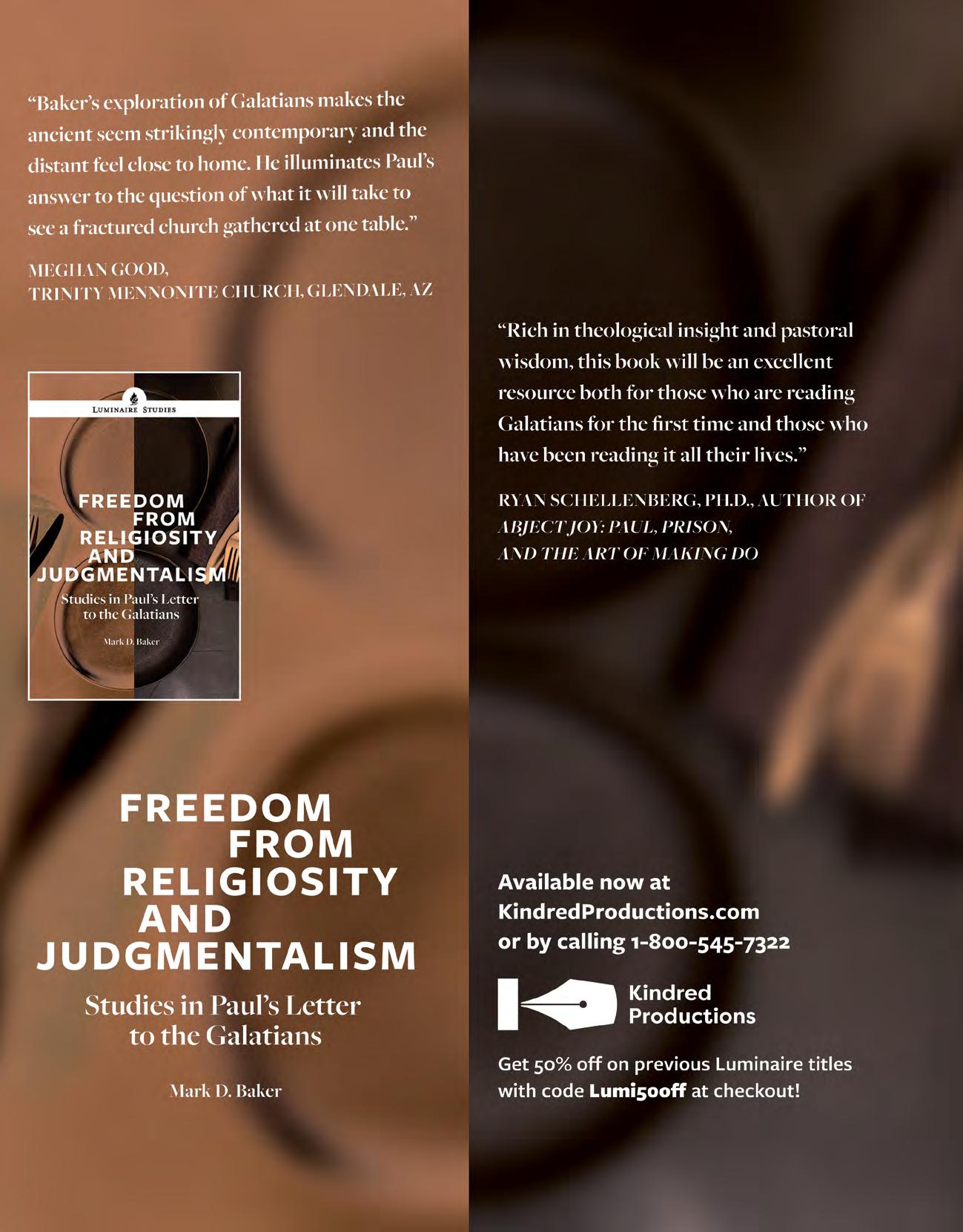
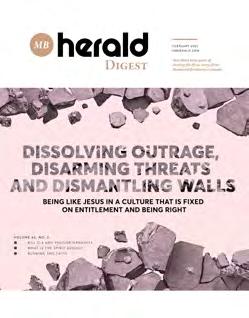

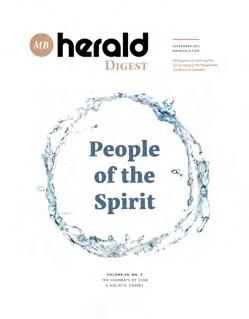
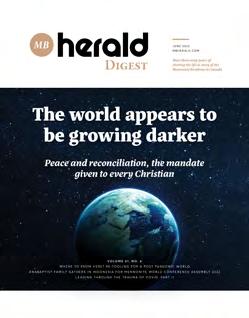


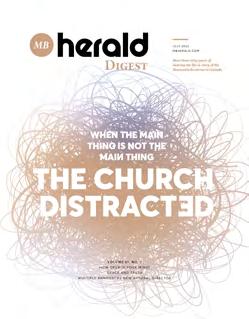
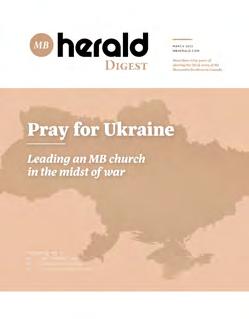

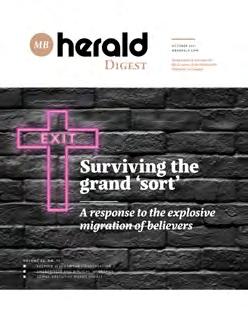


I have experienced growth in my faith, that is, except when I’m driving. If only I would leave on time. Recently, I became enraged by a car stopped in front of me for no reason. Despite no oncoming traffic and the light being green, they refused to turn left. Clearly, they were an idiot, and so I used my horn to express frustration and lack of respect for their dearth of driving skills. It felt good for me to be so miserable! My attitude quickly changed to shame when I finally noticed they were correctly waiting for an elderly lady to cross the street. Only then did I realize I was obnoxious, self-righteous, and quite un-Mennonite Brethren pastor-ish. Last time I checked the Bible, being a follower of Jesus is supposed to be a full-time gig.
Outrage is the ultimate reality distorter. It’s also an attractive false gospel. What?
In The Weight of Glory, C.S. Lewis noted the similarity of moral codes across different cultures and eras. In Mere Christianity, he also observed another common feature of humanity – our tendency to break the same moral standards. When we transgress a moral code, we rightfully experience the uncomfortable emotions of guilt, shame, or fear. While guilt, fear, and shame are distinct, they all stem from the same root cause: our conscience alerting us to the fact that we have missed the mark.
The good news of Jesus tells us that forgiveness to absolve guilt, honour to remove shame, and power to overcome fear are available as gracious gifts purchased through the finished work of Jesus Christ, his life, death, and resurrection. This gift of grace can be freely received by anyone who turns to Jesus in saving faith, offering eternal life and hope for the Kingdom of God both in this life and beyond the resurrection.
There are enticing alternative gospels that cleverly attempt to bypass the gospel of Jesus. These approaches aim to deal with our guilt, fear, or shame to varying degrees of success. We can group them into three broad categories.
Compensation: This is the most common alternative gospel. It acknowledges transgressions and the associated emotions, seeking justification by balancing the scales with good deeds covering over bad ones. This alternative gospel is often seen in human-centred religions, including mutated versions of Christianity that promote the idea of earning forgiveness through good works. People who are naturally self-disciplined can achieve a sense of self-righteousness that cloak feelings of guilt, fear, and shame. Jesus’ parable recounted in Luke 18:9-14 powerfully challenges this approach.
Medication: Guilt, shame, and fear are powerful consuming emotions, leading to a desperate desire to alleviate these negative feelings by any means possible. Alcohol, drugs, sex, distraction, extreme sports, shopping, entertainment, hobbies, career obsession, and so on can temporarily relieve these negative emotions. Turning to our chosen “drug” gives us a sense of righteousness by numbing or distracting us from our guilt, shame, or fear. While we universally recognize the dangers of this approach, such as addiction, it remains popular even among seasoned followers of Jesus.
Outrage: In the past decade or so, outrage has been gaining popularity as an alternative gospel, perhaps even surpassing the other approaches. Counter-intuitively, outrage is a pleasant emotion. It alleviates guilt, fear, and shame by giving us a strong sense of righteousness. It tricks us into believing that we are morally superior.
Dr. Jeremy E. Sherman, in his Psychology Today article titled “Maddiction: Addiction to Self-Righteous Outrage,” writes (using surprisingly theological words):
“You can’t believe they lied to you! How dare they? Your blood’s boiling, and you’re ready for battle. No one should get away with lying! Ever! You hate liars. You would never lie. Impossible, or at least impossible to remember in your current state. Outrage at other people’s failings evaporates all recollection of our similar failings. When outraged, we feel pure. Feel dirty? Bark at someone. You’ll feel cleansed....The more outraged we are at others, the more righteous we feel; the more righteous we feel, the more we feel duty-bound to be outraged at others. One can really rev out on that vicious cycle. It’s highly addictive. Call it ‘addiction,’ an addiction to getting mad for the self-purifying sensation. My addiction is the source of common undiagnosed madness, a mental illness because, though it makes one feel purged of sin, it’s an indulgence in the greatest violation of all: Ignoring reality.”
Dr. Sherman is not the first to write about anger creating faux righteousness in us. In the first century, James succinctly makes the same point in the Bible:
“My dear brothers and sisters, take note of this: Everyone should be quick to listen, slow to speak and slow to become angry because human anger does not produce the righteousness that God desires” (James 1:19-20).
James is not warning us that in anger, we are more likely to transgress (although that is also true, see Eph 4:26). In and of itself, anger is not a sin. Rather, he’s reminding us that anger doesn’t “produce the righteousness God desires.” Why would he need to emphasize
The danger of rage addiction threatens unity among Canadians and fellow brothers and sisters. Also, it fools us into a false sense of righteousness.
this? Because anger is a powerful emotion that deceives us—making us feel righteous even when we’re not.
Pete Williams, in his essay titled “Your Addiction to Outrage is Ruining Your Life,” writes:
“In 2020, outrage is the latest drug of society. It’s more acceptable than alcohol, and it’s more addictive than anything you can swallow, smoke, or inject because while heroin or methamphetamine are clearly harmful, anger feels so...righteous. After all, that other political party is ruining the world. Their supporters hate America (or whatever country you’re in). People are too selfish. We’re not doing enough for the poor. Women don’t have enough rights. Men don’t have enough rights. Those people are racists. That group doesn’t recognize their privilege. The president is a rapist. Capitalism is exploiting everyone who isn’t the 1%... We love being angry because it makes us feel smart. It makes us feel like we care more than the next person (who we assure ourselves doesn’t care enough) because we’re more across the facts than they are. That we have the necessary ideas to fix everything. That we’re the ones that need to be in charge. When we call someone a Nazi or a sexist, or a bigot, it’s not our opinion; it’s a fact. That when we call someone out or, worse, try to ruin their career, they deserve it. That’s an astounding level of arrogance.”
Social media and the changing landscape of legacy media economics have embraced the business model of increasing engagement by inciting our rage, not without disturbing effects. Many of us have sensed that our country is more polarized now than ever. Disagreement with someone quickly leads to becoming
their enemy. Legacy and social media deliberately fuel the fire, as their business models depend on stoking the flames to keep us scrolling. They generate outrage by directing us into personalized, algorithmically curated echo chambers. Civil society is fracturing with an intensity that terrifies many sociologists.
Even within church families, we have sometimes joined the digitally fueled bonfire of division. Political, technological, and economic ‘issue’ flags are sometimes raised above the flag of Jesus. We used to understand that godly Christians who cared about the same underlying ethical commands might sincerely disagree about specific economic, sociological, technological, or scientific policies and approaches that best accomplish those common goals.
For example, I carry a stash of loonies to give to panhandlers to express Jesus’ ethic of caring for the poor. Godly people in my church also seek to help the poor but sincerely believe that giving cash to panhandlers worsens their situation in the long run. I believe I’m right; they believe they are right. We’ve studied the issue but have come to sincerely different policy conclusions about how this plays out. Can Christians agree on Christ’s commands while still holding differing perspectives on which real-world policy best achieves that end in a complicated multivariant world? Even among Christians, increasingly disagreeing about the best policy to accomplish the same goal is equated with making them into an enemy.
Yet, for the sake of argument, let’s suppose for a moment we live in a simple black-and-white world—where there’s only one political or social policy that is 100% correct (which, coincidently, is the policy we hold to) and another policy approach is 100% wrong. Let’s also suppose that outrage is God’s way—and that any Canadian who disagrees with us is our ‘enemy.’ How should we think and act toward our “enemies”? Even then, Jesus and Paul had much to say about this situation (see Matthew 5:21-24, 5:43-48, Romans 12:9-21). Hint: It looks radically different from our outrage-addicted society.
The danger of rage addiction threatens unity among Canadians and fellow brothers and sisters. Also, it fools us into a false sense of righteousness. As James reminds us, “Human anger doesn’t produce the righteousness that God desires.” It gives us a feeling of righteousness that can trick us into thinking we are walking closer to God than we really are.
The “righteousness God desires” is simultaneously a gift of grace bestowed to us through faith (see Romans 5:1-11) and a progressive work of the Holy Spirit in us that requires our constant faith & grace-fueled participation (see Galatians 5). I’m amazed at the tension between how righteous I have been declared in Christ through faith and how much I still need to grow in the righteousness the Holy Spirit is striving to produce in me (see Hebrews 10:14). When I have drifted far from God the path back requires repentance, confession, and a return to walking in step with the Spirit. In short, first, I need to be convicted of my lack of righteousness. Then I need to humble myself before God and, via confession and dependence on the Holy Spirit, renew my inner and outer being. The flesh rebels against this, and even under the best circumstances, none comes naturally to me. So, bypassing this pathway for spiritual growth can be appealing.
How much energy have we wasted by our devotion to social media, current events, and the outrage issues of the day?
And, as though on cue, outrage appears with convenient notifications on our smartphones as the constant opportunity and seductive alternative. Outrage can bypass the effort of sanctification and give me a similar feeling of righteousness that is mostly a figment of my imagination.

I have sometimes noticed in myself a distance from God that pushes me away from quietness, prayer, confession, and the beauty of the Scriptures. It’s easier and less humbling to browse social media feeds, read a clickbait article about the evils of the ‘other side’ or anything else that generate a quick hit of outrage within me. My outrage creates a false sense of spiritual progress because I’m angry about the same things God is also angry about!
Recently, while preparing a sermon, I made the mistake of checking the headlines on my laptop. A few minutes earlier, the Supreme Court of the USA ruled on affirmative action in college admissions. True to modern form, the headlines were written in a way that would likely trigger anger regardless of one’s agreement or disagreement regarding the ruling. I thought about my friendship network, knowing people would be on both sides of this complicated policy issue. They all abhor racism but disagree on which policies better achieve that shared outcome.
For the first time in a long while, I was stressed and agitated. I went for a walk in our church parking lot to cool down, during which time it occurred to me - I’m not an American! Even if I were American, there would be nothing I could do about the ruling one way or another. My ‘issue’ anger was almost entirely
theoretical and accomplished precisely nothing. What useful purpose did my anger serve? It certainly wasn’t producing any real righteousness in me! Then, as I contemplated all this, I saw two men of two different races crossing my path, engaged in deep conversation. It occurred to me that what mattered more was not how I felt about something I could do nothing about but how I treated these men right before me.
How much energy have we wasted by our devotion to social media, current events, and the outrage issues of the day? Beyond feeling that familiar rush of ‘righteous’ vindication from our rage and rants about recent issues like covid, climate change, the last election, environmental policies, or any other social policy, did our anger or Facebook post about it make any difference on those issues whatsoever?
To be sure, the corrective to outrage addiction is not apathy. In a fallen world, anger is a God-given emotion that alerts us to what we perceive as injustice done to us or others. Yet, we need humility to accept that we are notoriously unreliable at distinguishing between perceived and real injustices. Anger, while not itself a sin, becomes harmful to us and others when we continually feed it and dwell on it. Even when we are justified in our anger, the scriptures call us to set aside our anger before the sun sets. For many of us, it’s long past time to cut the cords on our social media accounts and break the power of our smartphones.
How can we recognize when we have embraced continual outrage as a false sense of spiritual vitality? Here are a few questions we can ask ourselves:
Do we spend considerably more time being agitated on social media & news headlines than we do reading the Scriptures, praying, and confession?
Does our outrage regularly lead us to harbour sentiments toward people on the other side of an issue that conflict with Jesus and Paul’s commands in Matthew 5 and Romans 12?
Have we become obsessed and continually outraged about specific political, economic, sociological, or technological issues? (If unsure, ask a friend to tell you.)
Does our entire friendship network agree with us on what outrages us? Have we intentionally selected our network to exclude those who disagree with us?
How long do we simmer in anger about global issues we have no real power to affect? Is it going on for too long? (see Ephesians 4:26)
Do we generally feel righteous and close to God most often when angry about ‘issues?’
5:22)
…GREAT IS YOUR FAITHFULNESS. (LAMENTATIONS 3:23))
THE ONE WHO CALLS YOU IS FAITHFUL, AND HE WILL DO IT. (1 THESSALONIANS 5:24)
BUT THE LORD IS FAITHFUL, AND HE WILL STRENGTHEN YOU AND PROTECT YOU FROM THE EVIL ONE. (2 THESSALONIANS 3:3)
ur August “Moments in Prayer” is focused on prayers for the Holy Spirit to fill us with Faithfulness (Pistis). This is the seventh quality in the fruit of the Spirit list we find in Galatians 5:22-23. The specific Greek word pistis is commonly translated as “faith” (Matthew 9:22; 15:28; Luke 7:50) but because in Galatians 5:22-23 it is part of a list of Holy Spirit produced character qualities, most modern translations (cf. NIV, ESV, NRSV, NLT, etc.) translate pistis here as “faithfulness” rather than “faith” as in the KJV. Just as God’s character is faithful, so also does the Holy Spirit produce faithfulness in believers.
The word “faithfulness” implies trustworthiness, dependability, and sacrificial loyalty. When we pray for Holy Spirit filling that produces this kind of faithfulness in us and in our churches, we are praying for the presence of an ever-increasing loyalty and dependability that truly benefits family, friends, other believers, and neighbours—and shows the world something about God’s own faithfulness to humanity and all creation.
While this kind of faithfulness might sound like a simple promise to always be present to help and/or rescue people in need, it means more than that here. While police and other first responders are expected to be “faithful” to help and
rescue people, we are called to live out a faithfulness in line with the Holy Spirit’s will for each person. God is faithful, trustworthy, dependable, and sacrificially loyal to those who call on his name, but sometimes his faithfulness means that he will not help or rescue people when they are calling on him for rescue but have no desire to repent and pursue God’s Kingdom purposes (cf. Judges 2:16-22; 10:1114). The Holy Spirit fruit of faithfulness is like this—embodying a faithfulness in line with God’s desire for true life and flourishing for them.
Praying for faithfulness produced in us by the Holy Spirit involves being faithful to embody God’s character and will in the midst of our varied interpersonal relationships. This faithfulness will in many situations mean being present to help others in need as we are able. It will, in many situations, mean providing a listening ear and honouring confidentiality. But true faithfulness could also be expressed by the word “no” when saying “yes” would only produce movement away from God’s will for that person. The Holy Spirit fruit of faithfulness is deeper and more complex than simply being a person whom others can count on for help. It is a faithfulness that is always in the direction of God’s larger vision for true human flourishing, salvation, and Kingdom life.
May the Holy Spirit fill us with this kind of faithfulness visible to all those around us!
CONSIDER:
˚ What would it look like today to invite the Holy Spirit’s great faithfulness to wash over you, and to flood your inner life?
˚ Where do you need to the Holy Spirit to stream out this faithfulness toward your family, friends, and neighbours?
PRAY WORDS OF INVITATION AND WELCOME TO THE HOLY SPIRIT FOR YOUR OWN HEART:
˚ Welcome Holy Spirit! Come and Fill Me Today!
˚ Welcome Holy Spirit! Wash over me and flood my life with your faithfulness!
˚ Welcome Holy Spirit! May the faithfulness of Jesus overflow out of my heart upon today! (Repeat this with specific names of those in your sphere of influence. Be especially aware to include those you may find difficult to be faithful toward today.)
PRAY WORDS OF INVITATION AND WELCOME FOR THE CHURCH:
˚ Welcome Holy Spirit! May the faithfulness of Jesus overflow over our church family!
˚ Welcome Holy Spirit! May the faithfulness of Jesus overflow from our church to each visitor and each neighbour!
˚ Welcome Holy Spirit! May our faithfulness as a church draw people to a greater interest in responding to the invitation to become disciples of Jesus!
ESAU is the National Faith and Life Director for CCMBC. He and Karen attend The Life Centre in Abbotsford, BC.

Jo’s early years were spent in Landmark, Schoenwiese, and Blumenfeld, Man., where her father taught school. When she was 12, the family moved to B.C.’s Fraser Valley. She met the love of her life, Robert (Bob) Jacob Hiebert, in the spring of 1949, and they were married on Christmas Day that year. Settling in the Abbotsford area on a small acreage, they raised their family and engaged in mixed farming with dairy cattle, raspberries, and nursery stock, while Bob also worked as a barber. Early in their life together, Jo and Bob responded to the love and grace of God and put their trust in Jesus as Saviour and Lord. They were baptized on Sept. 19, 1955, and became members of East Aldergrove MB Church in Abbotsford, B.C., embarking on a journey of faith and Christian service that characterized their lives from that point onward. In early 1974, they bought into a grain and beef cattle operation near the hamlet of New Norway, Alta. There they became members of Highland Park Evangelical Free Church. After 12 enjoyable years in Alberta, they sold and moved to a hobby farm near Armstrong, B.C., returning to fellowship within the MB conference at Armstrong Bible Chapel. In 2007, they made their way back to Abbotsford to live in retirement, becoming members of Bakerview MB Church. Advancing years and associated health conditions meant that more support was needed, and so in the spring of 2019, they moved into an apartment in Primrose Gardens at Menno Place. Bob died in April 2022, almost four months after they celebrated their 72nd anniversary. Jo continued to cherish time with her family and to foster friendships to the very end. Her life was characterized by unwavering trust in God, generous hospitality, church ministry (teaching Sunday school, planning Sunday evening services, hosting Bible studies, singing), love for her family, enduring friendships, and community involvement. She also delighted in the beauty of God’s creation and enjoyed gardening, painting landscapes, camping, fishing, and travelling with Bob throughout Canada and beyond to places such as Alaska, Hawaii, Israel, Greece, and, on their last trip together, the Grand Canyon.
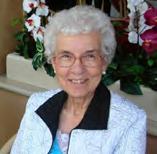
Birth: July 6, 1930 Birthplace: Winnipeg, Man.
Death: June 27, 2023
Parents: Jacob & Agatha Friesen
Married: Robert (Bob) Jacob Hiebert, 1949, [d. Apr. 19, 2022]
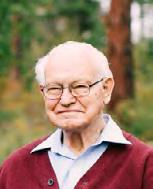
Family: children Robert (Karen), Susan Krause (Rick), Daniel (Dorothea); 6 grandchildren; 6 great-grandchildren; siblings Margaret Friesen, Mary Anne Epp
Church: Armstrong (B.C.) Bible Chapel; Bakerview (now The Gathering), Abbotsford, B.C.
Baptism: East Aldergrove MB (now Ross Road), B.C., 1955
Henry’s family were pioneer settlers on a 10-acre fruit farm in the Mennonite community in Niagara, Ont. His mother doted on her “sweet Heinz.” She sang her children to sleep. Their dad worked hard in those difficult early years; he was strict but deeply faithful to God. Henry attended Virgil Public School 1939-1947, then Eden High School until 1951. To quote Henry, “God in his great love and mercy saved me at the early age of eleven.” He credited the prayers and example of godly parents. Henry went to Eden Bible School, and then Ryerson Technical College. He trained as an electrical engineer technician, but his heart was always elsewhere: “My spiritual horizon and vision enlarged to include the whole world.” In Toronto, he “caught the vision of the possibility and necessity of doing Sunday School work.” His writings are filled with joy in leading others to the Lord. “God stopped me in my tracks with sickness for the two months it took me to yield to the Holy Spirit’s urging to attend MB Bible College in Winnipeg,” where he trained for missions and met and married M. June Enns. From 1958 on, Henry served as a Bible study leader in college, and then as Sunday School superintendent, in daily vacation Bible school, and at Moody Bible Institute. Henry and June created a warm home where God was always centre, with fun family trips, church activities, nightly reading sessions, and times of correction. God used Bruce’s question, “Dad, are you happy in your Christian life?” and the loss of Henry’s job of 27 years at GE Canada to lead Henry and June to Neuberg, Germany, to work with MCC and refugees in 1984. This was followed by assignments in Akron, Pa., and Nairobi, Kenya. God gave them the world to see as they worked for him. When Henry and June retired to Penticton/ Kelowna, they continued to visit family all over and work with MCC on SOOP assignments. Henry was treasurer in Grace MB Church and served The Gleaners. Henry and June moved to Kelowna in 2004 near Pearl and Ernie, Henry’s sister Marg (Vern) Borne, and many Wiebe cousins. Henry loved, followed, and cared for June until her death in 2020; he was the steady and quiet to her energetic busyness. He moved to Smith Creek Baptist Housing, West Kelowna. Henry valued God, family, and the people God gave him to love. Henry died as gently as he lived.
Birth: May 15, 1933
Birthplace: Winona, Ont.
Death: July 15, 2023
Parents: Jacob & Susan Friesen
Married: M. June Enns, 1958 [d. December 2020]
Family: children Pearl (Ernie) Fehr, Paul (Bonnie Ewert), Caspar (Jan Picard); 10 grandchildren; 13 great-grandchildren
Church: Fort Garry MB, Winnipeg; Grace MB, Penticton , B.C.; Willow Park MB, Kelowna, B.C.
Baptism: 1948, Virgil (Ont.) MB, 1948
Jacob “Jake” Born of Abbotsford, B.C., died May 17, 2023, at 96. He is survived by his wife Hilda (nee Klassen) to whom he was married for nearly 70 years. Jake was born in Sedalia, Alta., and moved to Matsqui Prairie, B.C., in 1948. He was a trucker and longtime dairy farmer in Mt. Lehman and Matsqui. Jake was profoundly grateful for God’s blessings which had come his way because his parents had taken the risks associated with moving from Ukraine to Canada in 1926. Jake grew up in Alberta, and in his teens attended boarding school in Rosthern, Sask. He committed his life to Christ at age 13 and was baptized in Cooking Lake, Alta., at age 15. He later attended Bible school in Coaldale, Alta., and then at Mennonite Brethren Bible Institute (now Columbia Bible College). In May 1953, Jake married Hilda Klassen, and they began dairy farming in Mount Lehman. Through their marriage, they faithfully attended various MB churches in the Fraser Valley, and found great joy in their senior years at Clearbrook MB Church. A high priority for Jake was his commitment to service. This desire motivated him to teach Sunday School in Matsqui and for several years at McConnell Creek in Mission. Jake served in various church leadership roles, sang in quartets and choirs, volunteered at Gleaners and donated blood regularly (well over 100 pints!). Jake will be sorely missed for his deep commitment to his wife, children, friends, and for his faith. Jake was known for his generous spirit, incredible work ethic, wry smile, dry sense of humour, as well as his guitar and harmonica playing. Employing his beautiful tenor voice, he sang in choirs and quartets from age 14 to 90. Psalm 90 was a passage he left as a reminder to his family and friends: “Lord, thou hast been our dwelling place in all generations. Before the mountains were brought forth, or ever thou hast formed the earth and the world, even from everlasting to everlasting, thou art God.”
Birth: May 14, 1927 Birthplace: Sedalia, Alta.

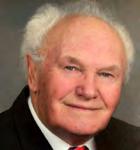
Death: May 17, 2023
Parents: Wilhelm & Katerina Born
Married: Hilda Klassen, May 28, 1953
Family: Hilda; children David (Loraine), Teresa, John (Ellie), J. Bryan (Teresa), Matthew (Debbie); 14 grandchildren; 26 great-grandchildren
Church: Matsqui, B.C.; County Line, Langley, B.C.; East Aldergrove (now Ross Road), Central Heights, Clearbrook, Abbotsford, B.C.
Baptism: Cooking Lake, Alta., age 15
Jake was the second son born to John and Sarah (Unger) Janzen, his brother Ben being the eldest. Jake was born in Ignatyevo, Russia, Nov. 29, 1930. His mother always said he was her sickly child. He struggled with sicknesses from the time he was born until he died. In 1933, his parents fled to Siberia, to Omsk, where they lived for 8 years and 4 more brothers were born: John, Henry, Nick, and Neil. In 1941, under threat of war and communism, they fled to Fuerstenland, and settled in the small Mennonite Village #1, close to Zaporizhzhia, Russia (now Ukraine). Russia and Germany were at war. Jake’s father was determined to get to Germany, so they followed the German army westward. There they learned that Stalin wanted all Russian citizens returned to Russia, so they fled to an International Refugee Camp in Germany, narrowly escaping being sent back. In Germany, Jake’s youngest brother Danny was born. Now they had 7 boys and would try to get to Canada. His father’s brother Jake had immigrated to Canada in 1926. Being well-established in Clearbrook, he and his wife Lisa were able to sponsor them all to come to Canada. In 1948, the family arrived in Quebec. Travelling by train across Canada, they arrived in Mission, B.C., on Mother’s Day. Jake moved to Vancouver to find work. There, he met Mary in 1951. Shortly afterward, Dad developed a tumour on his lung and was quite sick for a very long time. Mary stood by his side and they were married Aug. 9, 1953. In 1955, Jake got seriously sick again. This time he ended up losing one of his kidneys. It was a tough time; Mary had a baby and a very sick husband. In 1958, they became Canadian citizens and were welcomed by W.A.C. Bennett. In the next coming years, Victor, Anita, and Karien were born. Jake loved the Lord. Since 1948, when Jake accepted Jesus as Saviour, he did his best to point his family to Jesus. Jake prayed that his children would all respond to the Father’s drawing and come to Jesus; and yes, God will raise him up on the last day. What a glorious hope. On Monday, May 8, 2023, Jake was admitted to the hospital very ill, dying on Mother’s Day, only 3 months from Jake and Mary’s 70th wedding anniversary. Jake will be greatly missed by his brother Henry; many nieces and nephews; his children Ron (Hilda), Victor, Anita (Jim) and Karien (Brian); 7 grandchildren and 14 great-grandchildren; but mostly by Mary, his wife of almost 70 years.
Birth: November 29, 1930
Birthplace: Ignatyevo, Russia
Death: May 14, 2023
Parents: John & Sarah (Unger) Janzen
Married: Mary, Aug. 9, 1953
Family: Mary; children Ron (Hilda), Victor, Anita (Jim), Karien (Brian); 7 grandchildren; 14 great-grandchildren
Church: Clearbrook, Abbotsford, B.C.
John Martens was born in the village of Marienthal, Molotschna, Ukraine. He was the firstborn child of his parents. He lived in Marienthal until September 1943 when his family fled Ukraine with 350,000 others, of which 35,000 were Mennonites. The Great Trek took them across Ukraine, White Russia, Poland, and into Germany. When the war ended in 1945, they waited until March 1948 to come to Canada. John’s early life was severely impacted by civil war, societal anarchy, widespread famine, and Communism. At 11, he lost his father to the Communists. He would learn later that his father had died on his way to a concentration camp. He would say, though, on thinking back about his own family situation at the time: “Even under Communism, I had a wonderful family life. I had a very loving father.” After arriving in Halifax, Mar. 22, 1948, his family took the train to Yarrow, B.C., where they began their new Canadian life. John was baptized in 1949 into the Yarrow Mennonite Church where he also married Gertrude Esau in 1950. John and Gertrude had 5 children, 16 grandchildren, and 16 great-grandchildren. John spent 27 years at Ocean Cement until a workplace injury changed his life direction. Then he worked 4 years with Gertrude at Columbia Bible Camp (now Stillwood) and 14 years together for Mennonite Central Committee at The Cedars. John was grateful for the freedom he found in Canada. Worshipping freely in Canada meant everything to him. He was a member of MB churches for 74 years: Yarrow, Vancouver, Burnaby, Richmond, Yarrow (again), before ending his church life at Clearbrook MB. For the past 27 years of his life, he served in many ways on the Clearbrook MB board and through visitation. John’s faith was a practical one — he believed you needed to help your neighbour close by and far away. He was devoted to helping charities worldwide if he and Gertie saw the need. He said his three priorities were God, Gertie, and his family. He was a man of faith and hopeful in his eternal home with Jesus.
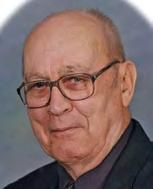
Birth: June 5, 1930
Birthplace: Marienthal, Molotschna, Ukraine
Death: May 18, 2023
Parents: Jacob John Martens & Anna (Kornelsen) Martens
Married: Gertrude Esau, April 16, 1950
Family: Marian (Eb), Jim (Nena), Tilly (Aubrey), John (Tabitha), Trudy (Manon); 16 grandchildren; 16 greatgrandchildren; siblings Jake Martens [d], Nick Martens, Anne Hamaguchi, Bill Bachman
Church: Clearbrook MB, Abbotsford, B.C.
Baptism: Yarrow (B.C.) MB, as a teen
The oldest of 15 siblings, Pete lived with his family in Waldheim, Sask., and then Vauxhall, Alta., where he finished his schooling early to work with his dad on the family farm. He committed his life to the Lord, was baptized, attended Coaldale (Alta.) Bible School, and sang in many church choirs and quartets. He married Anna Born in 1952 and they welcomed 5 daughters and 3 sons. They lived in Vauxhall, Swift Current, Calgary, Strathmore, and again, Calgary. Pete loved to laugh, telling jokes all his life to anyone who would listen. The Petkau home was constantly hosting friends and family for Sunday lunches, faspa, or a night’s stay. Pete loved to play his harmonica with Ann and their family. He liked driving, working on trucks, watching hockey and wrestling, and playing baseball. Later, he absorbed himself in Christian music and books. As spouses, grandchildren, and greatgrandchildren joined the family, many meals and laughs continued around the large table. Pete and Ann could be seen in their bedroom, nightly, on their knees praying for their family and friends throughout the world. Pete worked as a farmer, mechanic, truck driver, owner of Acorn Transport, furniture salesman, and before retiring, as custodian for Dalhousie Community Church. Pete volunteered as an usher at Highland MB Church, and as a coordinator/team leader for the Calgary Gideon church ministries, speaking in churches and delivering many Gideon hotel Bibles and the youth New Testaments throughout Calgary. Many restaurant staff who served him were also given a New Testament or asked to say a prayer for the meal. Pete loved sharing with people about the Lord. After Ann’s passing, Pete married Margaret Friesen in 2001. They lived in Calgary, close to Dalhousie Church, working in the church and serving with the Gideons. They enjoyed meeting family and friends at coffee shops or Boston Pizza. Their last 3 years were together in Auburn Heights Retirement Residence, where they made a big impact on many people for the Lord, with their love and caring hearts. The jokes and laughs continued as they spent their time with many of the residents, friends, and staff. Pete and Marg were faithful prayer warriors, often letting family “head home” at night so they would not miss their devotional time. Pete was predeceased by his parents, Anna, his son Donald, and his siblings Elizabeth and Abram.
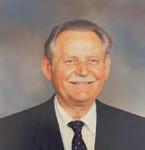
Birth: May 22, 1931 Birthplace: Oxbow, Sask.
Death: April 14, 2023 Parents: JDavid & Elizabeth Petkau
Married: Anna Born, 1952 [d.]; Margaret Friesen, 2001
Family: Margaret; children Betty (Ron) Quiring, Joyce (Russell) Maxwell, Vivian (Darcy) Siebert, Sharon (Jim) Loewen, Grace (Doug) Friesen, Donald [d.], Murray (Faye), Richard (Violet); 47 grandchildren; 54 great-grandchildren; stepson Daniel (Monica) Friesen; 3 step-grandchildren; 2 step-great-grandchildren; 12 siblings Church: Dalhousie, Calgary
